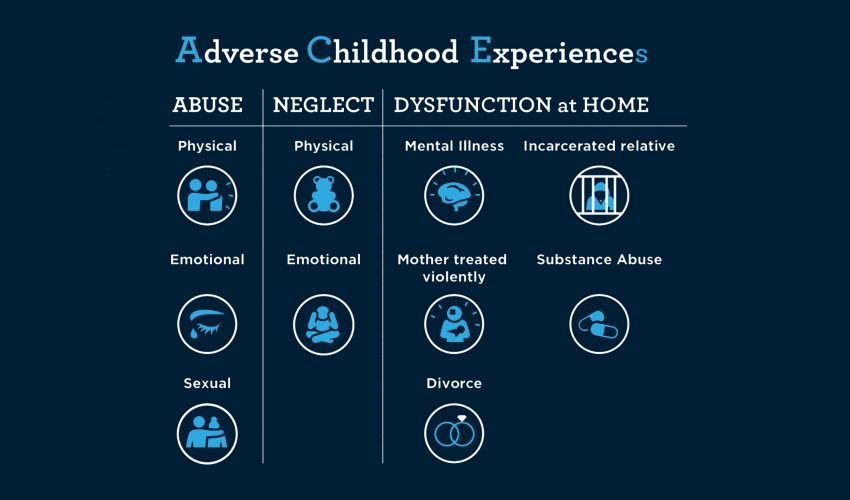Jump to survey.
What are ACEs?
Adverse Childhood Experiences (ACEs) are stressful or traumatic experiences that disrupt the safety and stability children need to thrive.
The most common ACEs are:

What’s your ACE score?
Answer yes or no to the questions below to calculate your score.
Before age 18:
-
Did a parent or other adult in the household often or very often:
- Swear at you
- insult you
- put you down
- humiliate you, OR
- act in a way that made you afraid that you might be physically hurt?
-
Did a parent or other adult in your household:
- often push, grab, slap, or throw something at you OR
- ever hit you so hard that you had marks or were injured?
-
Did an adult or person 5+ years older than you ever:
- fondle you or have you touch their body in a sexual way OR
- attempt or have any form of intercourse with you?
-
Did you often feel that:
- no one in your family loved you or thought you were important or special OR
- your family didn’t look out for, support or feel close to each other?
-
Did you often or very often feel that:
- you didn’t have enough to eat, had to wear dirty clothes and had no one to protect you OR
- your parents were too drunk or high to take care of you or take you to the doctor if needed?
-
Were your parents ever separated or divorced?
-
Was your mother or stepmother:
- often pushed, grabbed, slapped, or had something thrown at her OR
- often kicked, bitten, hit with a fist, or hit with something hard OR
- ever repeatedly hit over several minutes or threatened with a gun or knife?
-
Did you live with anyone who:
- was a problem drinker or alcoholic OR
- used street drugs?
-
Was a household member depressed or mentally ill OR did a household member attempt suicide?
-
Did a household member go to prison?
What ACEs mean
Adverse childhood experiences create toxic stress, which disrupts brain development, physically altering DNA.
- When children with ACEs kids grow up, they are more likely to experience poor medical and mental health outcomes, as well as issues such as violence and incarceration.
- The more ACEs you have, the more likely you are to experience these outcomes, especially if your score is 4 or higher.
A recent study found:
- 61% of Tennesseans had at least 1 ACE and
- 24% had 3+, which is equal to nearly 1 in 4 Tennesseans.
Fact, not fate
It’s important to remember an ACE score is a set of facts, not fate.
It doesn’t factor in lifestyle, genetics or positive experiences that build resilience, such as having a long-term relationship with one caring adult.
The ACE survey is a tool that helps people determine their risk factors and why they might act or feel the way they do, and it should be used as a starting point.
To learn more about ACEs, click here or use the resources below.

Click here to learn how Tennessee is shifting the focus from intervention to prevention with regard to ACEs.
Resources
Learn
To learn more about adverse childhood experiences, explore these resources:
- Tennessee Commission on Children & Youth: Tennessee’s ACEs Initiative
- kidcentral tn: Protecting Your Child and Building Resiliency
- ACE Awareness Foundation
- Tennessee Department of Health
- Centers for Disease Control and Prevention
- Robert Wood Johnson Foundation
Talk
To speak with someone:
- At the Tennessee Parent Helpline, call 800-CHILDREN (800-356-6767).
- At United Way’s comunity support line, call 2-1-1.
- At the Parent Support Warm Line administered by Le Bonheur Children’s Hospital, call 844-UPP-WARM (844-877-9276).
Read
To read more about ACEs from Better Tennessee, click here.
The post ACE Survey appeared first on Better Tennessee.

